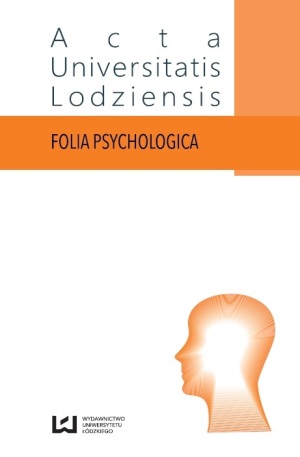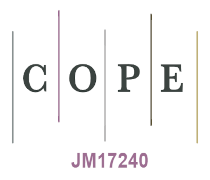The statuses of personal identity in adolescents living in Poland and Lithuania
DOI:
https://doi.org/10.18778/1427-969X.18.06Keywords:
statuses of identity, personal identityAbstract
Personal identity is one of the basic aspects of an individual. It gives her/him a sense of continuity, integrity, and individuality. The concept of identity was originated by Eric Erikson and later it was elaborated by James Marcia, who differentiated four statuses of identity based on four methods of coping with identity issues. Additional work with regard to the subject of personal identity was developed by Wim Meeus. The sense of personal identity develops throughout individual life span; however, the main crisis of identity occurs during adolescence. At this time a person asks herself/himself the fundamental questions related to self awareness: Who am I? What are my goals? What is important for me? Where we live, whether in a homeland or not, appears to have a great significance in shaping personal identity. The attempt was undertaken to compare the statuses of identity of young Poles living in Poland and those living in Lithuania. In the research there was employed a distinct measurement of four statuses of identity for four spheres of human functioning: a sphere of the relationships with parents, peers, a school, and an ideology. A range of interesting and varied results was obtained.References
Bambrowicz O. (2008). Polak mały poza Polską – „Ten inny” czy „ten obcy”?, http://www.badanialiterackie.pl/obcy/209-218_Bambrowicz.pdf [dostęp: 15.10.2012].
Google Scholar
Erikson E. (2004). Tożsamość a cykl życia. Poznań: Wyd. Zysk i S-ka.
Google Scholar
Grochmal-Bach B., Puchalska M. (2004). Tożsamość człowieka a teoria mikrogenetyczna. Kraków: Wyższa Szkoła Filozoficzno-Padagogiczna „Ignatianum”.
Google Scholar
Grygielski M. (1999). Style komunikacji rodzicielskiej a identyfikacja dzieci z rodzicami. Lublin: Wydawnictwo KUL.
Google Scholar
Kroger J., Martinussen M., Marcia J. (2010). Identity status change during adolescence and young adulthood: A meta-analysis. Journal of Adolescence, 33, 638–698.
Google Scholar
Marcia J. (1980). Identity in adolescence. [W:] J. Adelson (red.), Handbook of Adolescent Psychology. New York: Wiley and Sons.
Google Scholar
Marcia J. (1993). The status of the statuses: Research review. [W:] J. E. Marcia, A. S. Waterman, D. R. Matteson, S. L. Archer, J. L. Orlofsky, Ego identity. A Handbook for Psychosocial Research (s. 22–41). New York: Springer-Verlag.
Google Scholar
Meeus W. (1993). Occupational identity development, school performance, and social support in adolescence: Findings of a Dutch study. Adolescence, 28 (112), 809–818.
Google Scholar
Meeus W. (1996). Studies on identity development in adolescence. Journal of Youth and Adolescence, 25 (5), 569–598.
Google Scholar
Meeus W. (2011). The study of adolescent identity formation 2000–2010: A review of longitudinal research. Journal of Research on Adolescence, 21 (1), 75–94.
Google Scholar
Nowicka E. (2000). Polacy na Litwie – polskość zagrożona. [W:] E. Nowicka, I. Kabzińska, R. Wyszyński (red.), Polacy czy cudzoziemcy? Polacy za wschodnią granicą (s. 79–125). Kraków: Wydawnictwo Nomos.
Google Scholar
Rostowski J. (1999). Rola statusu tożsamości w procesie wyboru kariery zawodowej. [W:] H. Skłodowski (red.), Psychologiczna problematyka doradztwa zawodowego. Materiały do studiowania. Łódź: Wydawnictwo Uniwersytetu Łódzkiego.
Google Scholar
Raport o sytuacji Polonii i Polaków za granicą 2012 (2013). Warszawa: Ministerstwo Spraw zagranicznych.
Google Scholar
Rydz S. (2002). Rozwój tożsamości osobowej u młodzieży w świetle koncepcji Wima Meeusa. [W:] T. Rostowska, J. Rostowski (red.), Rodzina – rozwój – praca (s. 91–107). Łódź: Wydawnictwo Wyższej Szkoły Informatyki.
Google Scholar
Rydz S. (2005). Osobowościowe uwarunkowania przekształceń statusów tożsamości osobowej u młodzieży. Niepublikowana praca doktorska. Łódź: Uniwersytet Łódzki.
Google Scholar
Straś-Romanowska M. (2008). Tożsamość w czasach dekonstrukcji. [W:] B. Zimoń-Dubowik, M. Gamian-Wilk (2008). Oblicza tożsamości: perspektywa interdyscyplinarna (s. 19–46). Wrocław: Wydawnictwo Naukowe Dolnośląskiej Szkoły Wyższej.
Google Scholar
Trzópek J., Wasilewska M. (2008). Wpływ przekazów rodzinnych na problemy tożsamościowe związane z podejmowaniem ról społecznych przez kobiety u progu dorosłości. [W:] D. Kubacka- Jasiecka, M. Kuleta (2008). W kręgu psychologicznej problematyki tożsamości (s. 161– 179). Kraków: Wydawnictwo KUL.
Google Scholar
Wong T., Branje S., VanderValk I., Hawk S., Meeus W. (2010). The role of siblings in identity development in adolescence end emerging adulthood. Journal of Adolescence, 33, 673–682.
Google Scholar
Wyszyński R. (2013). Sytuacja Polaków na Litwie, http://historiapolski.eu/sytuacja-polakow-na-litwie-t9899.html [dostęp: 5.03.2014].
Google Scholar
Rostowski J., Rostowska T. (1986). Kształtowanie identyczności osobowej studentów jako tło psychologiczne oddziaływań wychowawczych. [W:] K. Jaskot (red.), Cele i zadania wychowania w szkole wyższej (79-99). Szczecin: Wydawnictwo Uniwersytetu Szczecińskiego.
Google Scholar
Downloads
Published
How to Cite
Issue
Section
License

This work is licensed under a Creative Commons Attribution-NonCommercial-NoDerivatives 4.0 International License.









